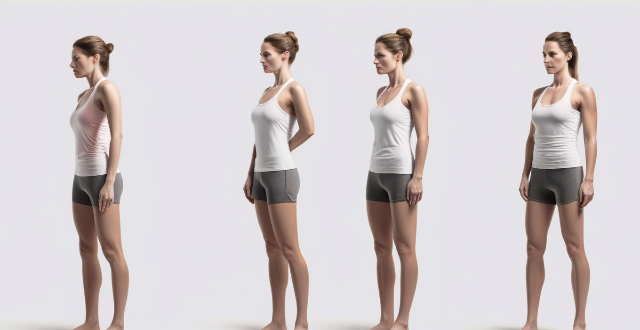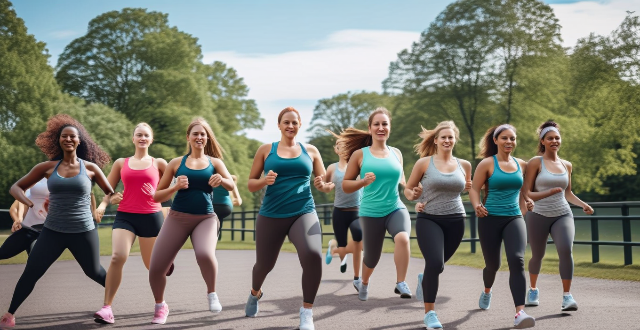Exercise Body

How does exercise influence hormone regulation in the body ?
Exercise affects hormone regulation in the body, impactingExercise affects hormone regulation in the body, impacting the intensity, duration, and impacting various hormones depending on the intensity, duration, and type of exercise. Regular exercise can increase testosterone levels in men and estrogen levels in women, reduce cortisol levels, and increase growth hormone levels. It can also improve insulin sensitivity and reduce insulin resistance, as well as maintain a healthy body fat distribution. However, excessive exercise or prolonged periods of intense training can have negative effects on hormone production and lead to low testosterone levels in men, low estrogen levels in women, high cortisol levels, low growth hormone levels, worsened insulin resistance, and decreased body fat distribution. Therefore, it is important to choose an appropriate type of exercise and maintain a balanced lifestyle for optimal hormone regulation and overall health.

How does exercise affect sleep quality ?
Exercise is crucial for maintaining a healthy lifestyle and has a significant impact on sleep quality. Regular physical activity can improve sleep onset, increase deep sleep, reduce stress and anxiety, regulate body temperature, and promote better breathing during sleep. To incorporate exercise into your daily routine, start slowly, choose enjoyable activities, schedule workouts, mix up your routine, be mindful of timing, listen to your body, stay hydrated, get enough rest, seek support, and track your progress.

Can exercise boost the immune system ?
Exercise can indeed boost the immune system through various mechanisms, including enhanced circulation, reduced inflammation, weight management, stress reduction, improved sleep, increased self-esteem and mental health, microbiome diversity, temperature regulation, prevention of chronic diseases, and social interaction. Regular moderate exercise is generally considered beneficial for the immune system, but it's essential to consult with healthcare professionals to determine the appropriate amount and intensity of exercise for individual needs and circumstances.

Why is it important to warm up before exercise ?
Warming up before exercise is crucial for preparing the body, preventing injuries, and improving performance. Benefits include increased blood flow, raised body temperature, loosened joints, prepared nervous system, reduced cardiovascular risk, and enhanced workout results.

Can heart rate monitoring help prevent overexertion during exercise ?
Overexertion during exercise can lead to fatigue, muscle soreness, and injuries. Heart rate monitoring is a technique used to measure the number of times a person's heart beats per minute (bpm). By monitoring your heart rate, you can determine personalized training zones based on age, fitness level, and goals, providing real-time feedback on current heart rate during exercise. Recovery time is essential for preventing overexertion, and heart rate monitoring helps determine how long it takes for the body to return to its resting state. Best practices for heart rate monitoring include choosing the right device, calibrating regularly, warming up properly, staying hydrated, and listening to your body. Following these guidelines and listening to your body can help prevent overexertion during exercise while maximizing its benefits.

How does exercise physiology help in preventing sports injuries ?
Exercise physiology helps prevent sports injuries by understanding body mechanics, energy systems, and recovery needs. Athletes can reduce injury risk through proper warm-up/cool-down, cross-training, progressive overload, and sufficient recovery time.

How does warming up prevent injuries during exercise ?
Warming up is crucial for preventing injuries during exercise by raising body temperature, increasing blood flow, and loosening up muscles. It also prepares the mind for the upcoming activity. General warm-up exercises increase overall body temperature, while specific exercises mimic the movements of the sport or activity. An effective warm-up routine should start slowly, focus on major muscle groups, include gentle stretches, and not be rushed. Incorporating a thorough warm-up can significantly reduce the risk of injuries and improve performance.

What should I do if I experience pain during exercise ?
Pain during exercise can be a sign of injury or overexertion. To prevent and manage pain, it is important to warm-up properly, stretch regularly, pay attention to your body's signals, incorporate cross-training, take breaks, drink plenty of water, use proper form, rest and recover, and seek medical advice if necessary. By following these steps, you can reduce the risk of injury and improve your overall fitness.

What are some common mistakes people make after intense exercise
Ignoring proper nutrition, not stretching, overtraining, drinking too much water and skipping breakfast are all common mistakes people make after intense exercise. It's important to replenish your body with nutrients it needs to recover and repair itself, stretch to prevent muscle soreness and stiffness, give your body enough rest and recovery time between workouts, drink enough water but not too much, and eat a healthy breakfast to refuel your body.

What are some common misconceptions about weight loss and exercise ?
This text discusses common misconceptions about weight loss and exercise, including the idea that skipping meals leads to weight loss, spot reduction is effective, more exercise equals more weight loss, weight training makes women bulky, cardio is the best way to lose weight, fad diets offer quick fixes, all calories are created equal, and you can out-exercise a bad diet. It emphasizes the importance of understanding these misconceptions to adopt healthier habits and set realistic goals for improved health and wellness.

What is the role of exercise physiology in improving athletic performance ?
Exercise physiology, a branch of science that studies the body's responses to physical activity, is crucial for improving athletic performance. It helps in understanding the body's reaction to different exercises, training methods, and recovery strategies. By applying these principles, athletes can optimize their training programs and enhance their results in sports. The text discusses the following key points: 1. **Understanding the Body's Response to Exercise**: This includes the differences between aerobic and anaerobic energy systems and muscle fiber types, which are crucial for determining suitable exercises for various activities. 2. **Optimizing Training Programs**: Periodization, intensity, and volume are essential elements in planning effective training programs. 3. **Recovery Strategies**: Proper nutrition, sleep, and active recovery techniques aid in post-exercise recovery. 4. **Injury Prevention and Rehabilitation**: Biomechanics, strength, and flexibility training play significant roles in preventing injuries. In conclusion, exercise physiology provides valuable insights into how the body responds to various training stimuli and recovery strategies, allowing athletes to make informed decisions about their training programs. This knowledge enables them to improve performance, prevent injuries, and achieve their goals more effectively.

What are the best exercises for a full-body workout at home ?
A full-body workout at home is an excellent way to maintain your fitness levels without the need for a gym membership or equipment. Here are some of the best exercises that you can do at home to get a comprehensive workout: 1\. Squats: Stand with your feet shoulder-width apart and your arms straight out in front of you, then lower your body by bending at the knees and hips until your thighs are parallel to the ground. Pause for a moment, then push through your heels to return to the starting position. Repeat this movement for 10-15 repetitions. 2\. Lunges: Stand with your feet hip-width apart and take a big step forward with one foot, then lower your body until both knees are bent at 90-degree angles. Keep your front knee directly over your ankle and your back knee hovering just above the ground, then push off with your front leg to return to the starting position. Repeat this movement for 10-15 repetitions on each leg. 3\. Push-Ups: Start in a plank position with your hands shoulder-width apart and your feet together, then lower your body until your chest nearly touches the ground. Push through your palms to return to the starting position. Repeat this movement for 10-15 repetitions. 4\. Plank: Start in a push-up position with your hands shoulder-width apart and your feet together, then lower your forearms to the ground so that your elbows are directly under your shoulders. Hold your body in a straight line from head to heels for 30 seconds to a minute. Repeat this movement for 3-5 sets. 5\. Burpees: Start standing with your feet shoulder-width apart and your arms at your sides, then lower your body into a squat position and place your hands on the ground in front of you. Jump both feet back into a plank position, perform a push-up, jump both feet forward so they land outside of your hands, stand up and jump into the air with your arms overhead. Repeat this movement for 10-15 repetitions.

Do yoga poses have different effects on the body and mind ?
Yoga poses have different effects on the body and mind, including improved flexibility, strength, balance, stress reduction, concentration, and emotional release. Incorporating a variety of poses into your practice can help you achieve specific goals and transform your body and mind.

Does exercise increase deep sleep ?
Exercise can increase deep sleep by promoting thermal downregulation and improving sleep efficiency over time. Regular exercise is recommended to enhance sleep quality, but timing is crucial to avoid sleep disruption.

What types of exercises are safe for pregnant women ?
Exercise during pregnancy can be beneficial, but it'Exercise during pregnancy can be beneficial, but it' right type of exercises that are but it's important to choose the right type of exercises that are safe and effective. Here are some exercise options that pregnant women can consider: 1. **Cardiovascular Exercises** such as walking, swimming, stationary cycling, elliptical training, and low-impact aerobics. 2. **Strength Training** exercises like bodyweight exercises, resistance band exercises, and dumbbell exercises using light weights. 3. **Flexibility and Balance Exercises** including yoga (prenatal classes recommended), Pilates (modified for pregnancy), Tai Chi, and stretching exercises. It's crucial to consult with a healthcare provider before starting any exercise program, listen to your body, stay hydrated, avoid overheating, and steer clear of activities with a risk of falling or abdominal trauma.

Is it safe to start a new exercise program during pregnancy ?
Is it safe to start a new exercise program during pregnancy? This article explores the topic, highlighting health benefits and potential risks. It emphasizes consulting with healthcare providers, choosing appropriate exercises, and monitoring body responses for safety.

Is it safe to exercise during pregnancy and what precautions should be taken ?
Is it safe to exercise during pregnancy? Yes, as long as you follow certain precautions and guidelines, including consulting your healthcare provider, choosing appropriate exercises, listening to your body, staying hydrated, wearing comfortable clothing, using proper technique, avoiding lying flat on your back, not pushing yourself too hard, cooling down properly, and being mindful of environmental factors. Exercise can have numerous benefits for pregnant women, such as reducing the risk of gestational diabetes, improving mood, increasing energy levels, and helping with recovery after birth.

How does exercise affect sleep patterns and quality ?
Exercise significantly influences sleep patterns and quality. Immediate effects include increased alertness and better body temperature regulation for sleep. Long-term, regular exercise improves sleep quality and regulates sleep patterns. Different types of exercise—aerobic, anaerobic, and mindful movements like yoga—all positively affect sleep but may require varying recovery times. The timing of exercise is crucial; morning workouts set the day's tone with minimal sleep interference, while late-night exercises can hinder sleep preparation. Tailoring workout routines to individual needs optimizes rest and overall well-being.

How does exercise contribute to bone health ?
Exercise contributes to bone health by increasing bone density, improving balance and coordination, strengthening muscles, improving posture, reducing inflammation, and enhancing cardiovascular health. This reduces the risk of osteoporosis, fractures, back pain, and other health issues.

Can excessive exercise lead to sleep disorders ?
Overtraining can cause sleep disorders by disrupting normal sleep patterns and causing physical stress and fatigue. Relaxation techniques such as meditation, yoga, or deep breathing exercises can help calm your mind and body before bed. Adjusting your exercise routine and creating a consistent sleep schedule can also improve sleep quality. If you continue to experience sleep disturbances, consult with a healthcare professional for further evaluation and treatment.